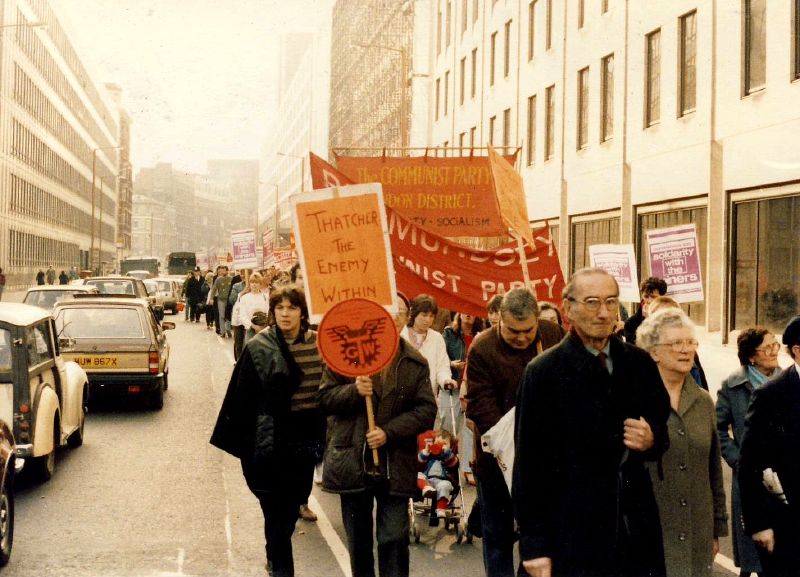 Nick from Bristol, UK, CC BY 2.0 , via Wikimedia Commons
Nick from Bristol, UK, CC BY 2.0 , via Wikimedia CommonsFrom Victorian match factories to modern-day postal depots, workers across Britain have stood up, walked out, and made themselves heard. These uprisings weren’t always big or tidy, and they didn’t always win. But together, they helped shape the rights, protections and working standards we often take for granted today. Here’s a look at some of the most powerful and defining moments in Britain’s labour history—times when ordinary people refused to stay silent.
The matchgirls’ strike of 1888
This walkout by young women at the Bryant & May match factory in London might not have involved huge numbers, but it packed a punch. The women were paid pitiful wages and exposed to white phosphorus, which caused a horrific condition called “phossy jaw”. After years of exploitation, 1,400 of them walked out. The press picked it up, the public backed them, and within weeks they’d won better conditions and pay. More than that, they proved that working-class women could organise and win, and that was a big deal in Victorian Britain. It lit a spark for future union movements.
The 1910–1911 Tonypandy riots
Miners in the Rhondda Valley had had enough. Wages were being cut, conditions were appalling, and the coal owners refused to budge. When the men went on strike, tensions flared, and clashes with police turned violent. Winston Churchill, then Home Secretary, sent in the army—a decision that earned him long-standing resentment in South Wales. Despite the crackdown, the strike helped galvanise the miners’ unions and brought national attention to the harsh reality of life down the pits. It didn’t end in victory, but it laid the groundwork for stronger collective bargaining in the years that followed.
The 1911 Liverpool general transport strike
Liverpool ground to a halt when 70,000 workers walked off the job. It started with seamen and dockers protesting low wages and long hours, but quickly snowballed to include railway workers, carters, and others. The city’s infrastructure collapsed. Police and military were called in, and two men were shot dead. The chaos shocked the government and showed just how much power organised labour could wield. It also prompted greater support for trade unions and was one of the key moments leading to the foundation of the National Union of Railwaymen.
The 1926 general strike
This was the big one—nearly 1.7 million workers across multiple sectors walked out in support of coal miners who were facing wage cuts and longer hours. For nine days, the country teetered on the edge of paralysis. Buses stopped, newspapers weren’t printed, and trains barely ran. The government prepared for the worst, even mobilising a volunteer force to keep basic services going. The strike eventually collapsed, but it shook the establishment. Though it didn’t get the result unions had hoped for, it hardened the resolve of the labour movement and reshaped public awareness of industrial disputes.
The Battle of Cable Street, 1936
This wasn’t a strike in the usual sense, but it was a pivotal moment for working-class solidarity. When Oswald Mosley’s British Union of Fascists planned to march through the East End—a hotbed of Jewish and Irish communities—tens of thousands of locals, including dockers and trade unionists, blocked the streets. “They shall not pass” became the chant of the day. Skirmishes with police erupted, but the march was stopped. It showed that the working class wasn’t just fighting for wages—it was also ready to stand against hate and division. It’s remembered as a proud moment of resistance.
The Ford Dagenham sewing machinists strike, 1968
It took a group of women in a car factory to change equal pay law in Britain. When Ford’s Dagenham plant graded female sewing machinists as unskilled—and paid them accordingly—they walked out. Production of the popular Cortina car ground to a halt. Their protest caught the attention of the employment secretary, Barbara Castle, and pushed the government to pass the Equal Pay Act of 1970. The strike wasn’t just about money; it was about recognition and fairness. These women proved that you didn’t have to be part of a big union to make a big impact.
The Grunwick dispute, 1976–1978
This one stood out for how it challenged racial inequality in the labour force. South Asian women working at the Grunwick film processing plant were subjected to poor pay and conditions. When they went on strike, they faced hostility, arrests, and dismissal. But their stand drew support from thousands of union members across the country. It was messy and dragged on for two years without victory, but it forced trade unions to reckon with their own lack of diversity and changed how the British labour movement viewed race and solidarity.
The miners’ strike of 1984–1985
Arguably the most divisive industrial dispute in British history, this strike was about much more than pit closures. Margaret Thatcher’s government wanted to reduce the power of the National Union of Mineworkers (NUM), and the NUM fought back hard. Whole communities were split—some miners stayed on the job, others manned the picket lines for months. There were violent clashes, mass arrests, and widespread hardship. In the end, the government won. The NUM was weakened, and many mining communities never recovered. Still, the strike left a lasting mark on Britain’s political and social fabric.
The Wapping dispute, 1986–1987
Rupert Murdoch’s decision to move his newspaper printing operations to Wapping, and sack around 6,000 unionised workers, set off a major industrial battle. The printers’ unions were furious, and picket lines formed outside the new plant. But Murdoch had prepared well: the new site used modern technology and was protected by police. The strike failed, but it reshaped the newspaper industry. Old-style print unions lost their grip, and the dispute became a symbol of how quickly labour could be outmanoeuvred in a changing economy. It was a bitter lesson about modernisation and power.
The Royal Mail wildcat strikes, 2003
Even in the 21st century, spontaneous industrial action can still pack a punch. When Royal Mail management introduced changes without agreement, postal workers around the country walked out in unofficial strikes. There were no union ballots, just frustration boiling over. Deliveries stalled, and the disruption cost millions. It was a wake-up call that even in a world of emails and automation, some things still grind to a halt without people sorting and delivering post. The strikes also showed that top-down change only works if you bring people with you.
Why these uprisings still matter
These moments weren’t just about wages or working hours. They helped shape how labour is treated in Britain. They pushed governments to rethink laws, forced unions to evolve, and reminded everyone from politicians to employers that workers aren’t just cogs in a machine. Some ended in defeat, others in real change, but all of them mattered. And in a world that still debates fair pay, working conditions, and union power, their legacy is still felt today.



